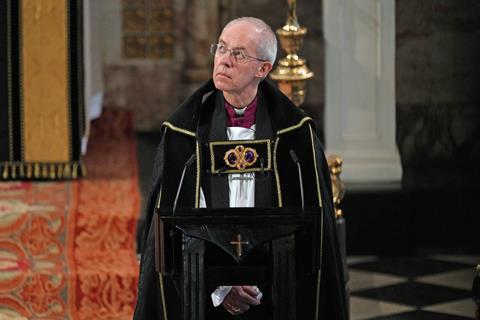He brought down predatory payday lenders, turbocharged evangelism and even welcomed refugees to live with him at Lambeth Palace. But unresolved issues of sexuality and safeguarding dogged Welby throughout his tenure. Tim Wyatt looks at the highs and lows of Justin Welby’s time as Archbishop of Canterbury

Justin Welby has formally laid down his crozier, ending his nearly 12-year stint as Archbishop of Canterbury.
His time in office will be forever marked by how it ended after he became the first archbishop to resign in disgrace, following a critical report over a safeguarding scandal. But his decade and more in office was hugely eventful and influential long before the John Smyth abuse story.
Welby entered Lambeth Palace as the 105th Archbishop of Canterbury in 2013. He arrived as the head of the Church of England and global Anglican Communion as a total unknown, having only served as a bishop for six months before being plucked from relative obscurity to become the Primate of All England.
Top of his agenda at the beginning was the long-running effort to allow women to become bishops in the CofE. Welby deftly oversaw the shepherding of a reworked bill through the synod in record time, and by 2015 the first women were being consecrated as bishops. Today, there are eight women leading dioceses and a further 24 serving in more junior bishop roles, and the package of reforms (including, crucially, conscience provisions for conservatives opposed to women’s ordination) passed in Welby’s early years has mostly stood the test of time a decade later.
A different kind of archbishop
Welby first made his name beyond the walls of the church in 2013 when he spearheaded a campaign to clamp down on predatory and exploitative payday lenders, quickly dubbed the “war on Wonga”. Drawing on his own background in finance and business, Welby not only waded into the politics of debt and credit, but also led moves within the CofE to help, setting up a church credit union as a fairer alternative. This helped marked him out as a very different kind of archbishop to his predecessor Williams, a cerebral poet-theologian known for his impenetrable language. It also set the tone for what would be a decade of regular interventions in politics.
Welby was unafraid to share his own views at times, whether it was on Brexit (he came out for Remain ahead of the referendum) or more recently the Conservative government’s Rwanda migrant plan (he attacked it as ungodly). This brought him plenty of opprobrium from Tory MPs who urged him to “stick to the Bible”, but remained fairly popular within the church and certainly helped raise the profile of Christianity.
Ever the activist evangelical, Welby was keen to not simply lob verbal denunciations at Westminster across the River Thames from his comfortable palace in Lambeth. He also sought to live out his social justice principles. Most famously, at the height of the refugee crisis in 2015 he called for more generosity and welcome to those fleeing to Europe and then followed this up by offering to host a family of Syrian refugees at Lambeth Palace. This eventually became the pilot of a new programme of community sponsorship refugee schemes nationwide.
Sharing the good news
Welby consciously set evangelism and witness as one of his priorities for his time in office, pledging to try to work Jesus’s name into every media appearance he could as well as unleash more evangelism across the church. The latter has only happened in fits and starts, although the annual Thy Kingdom Come campaign has been a notable success. But he did manage on a number of occasions to use his platform as archbishop to speak gospel truths into the public square. Most impressively, in 2016 a newspaper revealed that Welby was the product of a secret extramarital affair after a DNA test confirmed the archbishop’s biological father was actually Winston Churchill’s secretary. Welby navigated that astonishing and sordid revelation with poise and grace, famously declaring in a statement reported around the world that he found his identity not in his DNA, but in Christ.
However, while at times finding his voice in the public square, at other moments Welby seemed more of a bystander, most notably during what was the biggest national crisis of his time in office - the covid pandemic. Welby and the CofE in general struggled to cut through and offer much to a country locked down and fearful of a deadly virus. Instead, the archbishop got caught up in a bitter internal spat with his own vicars, after ordering them to stay at home during lockdown and not continue livestreaming services from their shuttered churches. This episode, now mostly forgotten, seems perhaps emblematic of much of Welby’s time in office: always trying to reach outwards and turn the church away from itself and towards the nation, and yet constantly getting bogged down in divisive internal conflict.
Getting off the fence on sexuality
The biggest conflict by far has been over same-sex relationships. Throughout his twelve years at Lambeth Palace, Welby has been wrestling with how to keep the CofE together over this explosive issue which splits parishes and dioceses in two. After initial rounds of consultation and mediation (and endless calls for “good disagreement”) only served to inflame tensions on both sides, eventually Welby led the House of Bishops to an attempted compromise solution. The CofE would for the first time offer gay couples prayers and services of blessing in church, but would not permit same-sex weddings and would retain its formal doctrine that marriage is for one man and one woman only.
Unsurprisingly, this messy fudge has pleased neither liberals nor conservatives. Welby has been accused of riding roughshod over church law and doctrine by conservatives, perhaps especially aggrieved by what they see as the betrayal of a man raised in evangelicalism (and a one-time worshipper at the Anglican megachurch HTB). Equally, his efforts to keep restless conservatives within the church has angered pro-LGBT liberals who resent his equivocation.
Recently, Welby finally climbed off the fence and revealed in an interview he (and most of the rest of the bishops too) now believed that God affirmed sexually active but lifelong gay relationships, putting his own views in apparent contradiction to the official teaching of his church.
While the pro-gay marriage wing is now in the ascendant, there remains a substantial minority of traditionalists and evangelicals holding out. The blessings farrago remains an unresolved mess as he departs Lambeth Palace for the last time. Few on either side really believe the issue of sexuality will be truly settled any time soon. Deep fractures have been opened up by the debate and the conservative evangelical wing has coalesced into a hardened and well-organised faction determined to force through its way or break the church apart. Rather than finally drawing a line under a topic which has provoked division for a generation, Welby is instead handing over to his successor a church more fragile than ever.
This conflagration has also had deep consequences for the Archbishop of Canterbury’s other job – as the de facto leader of the global Anglican Communion of 40-odd independent denominations. The Communion was already in crisis when he came into office, as the thriving and more conservative Global South churches fell out with their liberal Western sister churches over their ordinations of gay bishops. Welby spent years trekking around the Communion trying to patch relationships back together and rebuild trust, but it was mostly in vain. After the PLF saga erupted in 2023, a large minority of churches publicly stated they would no longer recognise Welby as “first among equals” because of his efforts to bring the gay blessings into land. While Welby has made noises about being open to handing over leadership of the Communion to someone else rather than always leading from Canterbury, this remains another open and unresolved tension for his successor to navigate.
Renewal vs decline
Closer to home, renewal of the CofE has also been a priority for Welby. Early on he launched an energetic reform and rejuvenation project, which sought to streamline bureaucracy, energise lay people, boost clergy numbers and redirect some of the church’s reserves towards new and innovative kinds of ministry. This has seen some significant fruit, most notably with a wave of church plants (often led by HTB) funded by large grants from the central church hierarchy. Many of these have turned into buzzy and successful turnarounds of dying parishes and have been welcomed by bishops across the spectrum. But they have also whipped up resentment from others, who believe traditional parish ministry is being starved of funds in favour of trendy, new-fangled plants.
How much responsibility Justin Welby should personally take for the trend of long term decline is debatable. Nevertheless, much of the other longer-term institutional reform has failed to move the needle. Ordination numbers did rise for a few years but post-covid have slipped back again, while the church remains mostly hidebound by its eccentric medieval rulebook and inherited structures and struggles to respond nimbly to accelerating decline. Perhaps the most deep-rooted legacy of these renewal programmes is a vibrant pro-parish movement of traditionalists, now well-represented on the synod too, who seek to stymie any efforts by the bishops and hierarchy to nudge the CofE towards modernisation.
The other major thread of his time in office has been safeguarding. A seemingly never-ending string of abuse scandals, historic and current, have erupted over the past twelve years, revealing how poorly the church has protected children and vulnerable people from the hundreds of abusers lurking in its midst. Welby has energetically overseen an enormous boost in spending and attention on safeguarding, and multiple rounds of reforms, but still the crises continued to come until in the end the Smyth scandal destroyed his own archiepiscopate. Ironically for a man whose career was ended by a critical safeguarding report, Welby can justifiably claim to have led the church into a vastly better place than it was when he found it in 2013, when there was only a single, part-time member of staff at the national church working on safeguarding. And yet, as with many of his efforts, no matter the progress it has never seemed enough. As he leaves office the synod debate is weeks away from approving yet another vast shake-up of safeguarding, by outsourcing most of its work to an independent body.
Although his own failings in the Smyth case according to the independent Makin report were actually more minor than is often presumed, by falling on his sword Welby has sealed his reputation. He will not be known as the archbishop who brought down predatory payday lenders, sealed equality for women in the church, turbocharged evangelism, welcomed in refugees, or historically offered blessings for gay couples. He will instead be forever remembered, fairly or unfairly, as the archbishop who failed to stop the church’s most prolific abuser.



































3 Readers' comments